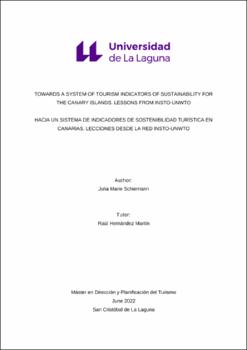Towards a system of tourism indicators of sustainability for the Canary Islands. Lessons from INSTO-UNWTO. Hacia un sistema de indicadores de sostenibilidad turística en Canarias. Lecciones desde la Red INSTO-UNWTO
Autor
Schiemann, Julia MarieFecha
2022Resumen
The Canary Islands registered record arrivals in recent pre-pandemic years. However,
quantitative growth has positive and negative socio-cultural, economical, and environmental
impacts. To control, and eventually mitigate these impacts, they are measured as indicators.
These destination tools contribute to monitoring sustainability, managing tourism activity, and
promoting evidence-based decision-making in the long-term. The aim of this master
dissertation is to develop a system of indicators of tourism sustainability adapted to the Canary
Islands with the support of previous experiences within the International Network of
Sustainable Tourism Observatories of the World Tourism Organisation (INSTO-UNWTO) and
other main international systems of tourism sustainability indicators. The major results include
a system of indicators and real data of key issues related to tourism sustainability. The
indicators have been applied by some international members on different territorial scales,
even if there is still a lack of quantifications about waste, water, and climate effects in tourism.
The International Network of Sustainable Tourism can indeed be seen as a model to follow,
but needs to improve towards better indicators on sustainability, particularly at the local
destination scale.
Key Words: sustainability, system of indicators, tourism, Canary Islands, tourism
observatories, INSTO Canarias registró llegadas récord en los años previos a la pandemia. Sin embargo, el
crecimiento cuantitativo tiene impactos socioculturales, económicos y ambientales. Tanto
positivos, como negativos. Para controlar y eventualmente mitigar los impactos, se miden
como indicadores. Estas herramientas contribuyen a monitorear la sostenibilidad y a gestionar
la actividad turística en el destino, basándose en evidencias a largo plazo. El objetivo del
Trabajo Fin de Máster es desarrollar un sistema de indicadores turísticos de sostenibilidad,
adaptado a Canarias, apoyándose en las experiencias previas de la Red Internacional de
Observatorios de Turismo Sostenible de la Organización Mundial del Turismo (INSTO-OMT),
y otros principales organismos internacionales. Los principales resultados incluyen un sistema
de indicadores y datos reales relacionados con problemas claves del turismo sostenible,
indicadores que han sido aplicados por algunos miembros internacionales a diferentes
escalas. Sin embargo, todavía hay una falta de cuantificaciones sobre residuos, agua y los
efectos climáticos en el turismo. Por ello, la Red Internacional de Turismo Sostenible puede
verse como un modelo a seguir, pero necesita mejorar en indicades de sostenibilidad, sobre
todo a escala local de destino





